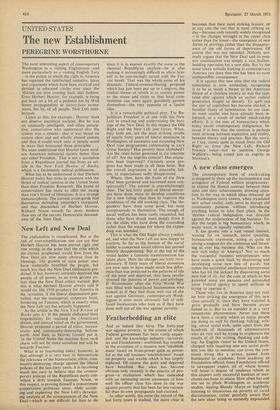Featherbedding An elite
And so indeed they have. The forty-year war against poverty, in the course of which Federal government has been vastly expan- ded, and the knowledge industry—universit- ies and Foundations—mobilised, has resulted in the evolution of a massive new 'establish- ment' based on brain-power quite as power- ful as the old business 'establishment' based on property and wealth which it has largely replaced. Of course the poor and deprived have benefited. But what has become obvious only recently is the paucity of pro- gress—a realisation which has coincided with an increasing recent awareness of how well the officer class has done in the war against poverty that has been far less success- ful than its own propaganda had claimed.
In other words, the more the record of the last forty years is studied, the more clear it becomes that their most striking feature, or at any rate the one that is most striking to- day—because only recently widely recognised —is the changes wrought in the upper class rather than the lower—the emergence of new forms of privilege rather than the disappear- ance of the old forms of deprivation. Of course this was not intended. Nobody seri- ously argues that the New Deal and its post- war continuation was simply a vast feather- bedding operation for a new elite. But by the same token nobody looking at contemporary America can deny that this has been its most undisputable consequence.
It is against this new elite that the radical conscience is now embattled, recognising it to be as much a threat to the American dream of a classless society as was the capi- talist elite against which an earlier radical generation fought so fiercely. To spell out the sins of capitalism has become old-hat, a familiar litany of lamentation. In any case, its most scarlet sins have already been re- formed, as a result of earlier muck-raking efforts. It is the sins of bureaucracy which today excite contemporary indignation, be- cause it is here that the contrast is perhaps most striking betWeen aspiration and reality, between theory and practice. But the scorn, as I say, comes quite as much from the Old Right as from the New Left, Richard Nixon's voice—not to mention George Wallace's—being raised just as angrily as M arcuse's.










































 Previous page
Previous page